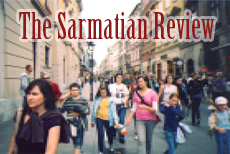| This Issue | Back Issues | Editorial Board | Contact Information |

September 2009
Volume XXIX, No. 3
Throwing Poland down a Memory Hole
On 31 July 2009 Professor
Zdzisław Krasnodębski published in Rzeczpospolita an article about the ideological anti-Polishness in some intellectual circles of the United States and Western Europe. Among numerous examples Krasnodębski mentions the case of a Polish-born American scholar who spent half of his professional life at minor universities while writing scholastically respectable books about Poland in the Second World War. The best of these books did not even get a review from the leading American journal on Slavic affairs. However, in the 2000s he wrote two ideological pamphlets about Poles as barbarous chauvinists in the Second World War; they received wide publicity and scores of uncritical and laudatory reviews, while the author gained world renown and was offered a professorship at one of the most prestigious American universities. He is now considered an American expert on Eastern European history. Krasnoębski also mentions the denial of the Eastern European Chair to Norman Davies at Stanford a quarter-century ago, and numerous other events of American and German intellectual life. The editor of Chesterton Review, Fr. Ian Boyd, had earlier described anti-Polishness as a form of anti-Catholicism.
Krasnodębski’s article is provocative, and it makes one reflect on the events he did not mention. For over a decade now, the Jurzykowski Polish Chair at Harvard has remained unfilled. The excuse we hear is that Harvard cannot find an appropriate person to fill it. Yet Jagiellonian University and University of Warsaw teem with able Polonists (some of whom contributed to the volume (Nie)obecność reviewed in this issue of SR) whose professional credentials compare favorably to some of the current Harvard professors in Slavic languages and literatures. Another item: two years ago, a Polish American bequeathed to the University of Illinois-Chicago an endowment for three chairs in Polish studies-two in history and one in literature. We have not seen any signs in professional periodicals that UIC is vigorously searching for scholars willing and able to fill these chairs.
If there are Polish Americans who still believe that they have been treated fairly in academia, they should study these examples very attentively. Δ
Back to the September 2009 Issue
The Sarmatian Review
sarmatia@rice.edu
Last updated 10/31/09